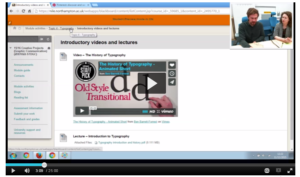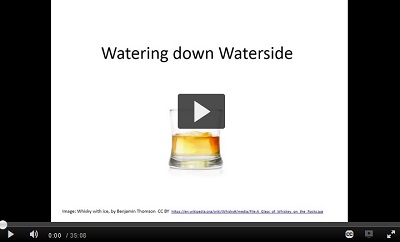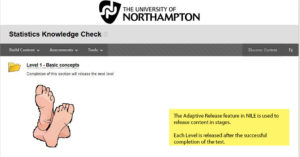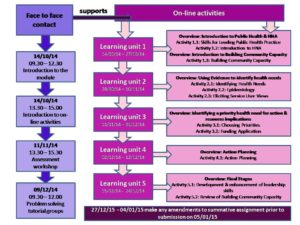In this video James talks through the ways that he has changed his use of NILE to make learning more interactive and to ensure students are better prepared for class.
In this video Sylvie talks about how she has been changing the delivery of academic skills to develop the the level of integration between generic academic skills and subject specific skills. In addition, she explains the process of integrating blended approaches into CfAP’s (Centre for Achievement and Performance) delivery.
[Posted on behalf of Elizabeth Palmer]
When starting to make online activities for blended learning there is a temptation to take content that is currently being delivered face-to-face in lectures (through software such as Powerpoint) and moving that content into an online format where the students are ‘digitally page turning’ through material: read or watch x, y and z before class.
The learning and teaching plan for blended learning is that we are creating interactive activities that support students towards developing their own knowledge, understanding and creating outputs that can then be used in class. In other words we are trying to flip the focus away from tutor created content that the student must passively absorb, to student-led interactive and created content.
Any content provided to students should be done in an interactive, discovery based way i.e. rather than telling them the answer we allow them to discover the answer through questioning, testing, trialling, problem solving etc. online and then reinforce and develop this face to face. If you are trying out e-tivities for the first time Xerte can be a useful package to start this process. Have a look at these two examples of using Xerte to make interactive activities on academic skills: here and here. Whilst they are not necessarily perfect, they demonstrate how you can use Xerte’s functionality to create knowledge checking, interactive exercises that you could then build on in class or use as a basis for students to undertake a more complex task.
The following presentation by Dr. Rachel Maunder entitled “Watering down Waterside” provides a summary of a similar presentation delivered at the School of Social Sciences Learning and Teaching event in February 2016.
Incorporating the Institute of Learning and Teaching’s (ILT) Direction of Travel video, the presentation provides advice and strategies for programme teams when thinking about the design of their modules and programmes for delivery now, and in preparation for Waterside, linking the use of NILE and the NILE benchmarks, describing blended learning and flipped learning approaches (with examples such as the module PSY1006 – Becoming a Psychologist), and introducing elements of the CAIeRO process.
[Posted on behalf of Anne Misselbrook – Content Developer]
Dr Michael Curran PhD, MBA, MPhil is an Associate Professor (Podiatry) and module leader for research methods in Podiatry at the University of Northampton.
One of the research methods modules taught over three years of the BSc Hons Podiatry course is inferential statistics. Mike was keen to increase the blend of this material between face to face delivery and online activity, and this resulted in the Statistics Knowledge Check. He has completed the cycle of transferring content online and students provided feedback using a survey included in the Statistics Knowledge Check.
One of the Podiatry students noted:
“I found tackling the Knowledge Check in 4 separate stages hugely useful and much more manageable than being exposed to a larger test. I found the separate stages less intimidating”.
Dr Curran reflected on the experience:
“It is interesting to me how to blend the concept of e packages with actual face to face teaching. I guess it is the future.
On reflection I think we have hit the middle ground of evaluation with no very favourable student comment, but equally no very unfavourable comment. Considering this is teaching statistics that is probably pretty good!!
My reason for doing this is to try and look at alternative ways of delivering a potentially dry subject, with ability for the students to reflect on the statistics at a future date.
I would consider repeating this approach for other areas of my teaching”.
To read the full blog article please click here. Using an online Gamification approach to teaching inferential statistics
To find out how to use the Adaptive Release feature in NILE please click on the link here
Learn more from Blackboard Help click here
Dr. Stuart Allen recently redesigned his level seven epidemiology module in order to add some pre-class blended/distance learning elements into it.
You can find out what worked well (and what didn’t work so well) in this audio interview with Dr. Rachel Maxwell: http://www.kaltura.com/tiny/nrimm
Leading Public Health Practice (NURM009) includes learning and teaching activities that are predominantly facilitated via online learning. It was felt that a clear strategy was needed whereby students would be able to identify clearly how the activities and associated feedback can contribute to their summative assignment.
Students work sequentially through five learning units, each of which contains a brief overview of theoretical concepts and supported with structured on-line activities. Each learning unit concludes with a summary identifying how learning from each on-line activity can be utilised within their summative assignment.
For more information about this assessment, please contact Sue Everett, Senior Lecturer—Advanced Practitioner (Sue.Everett@northampton.ac.uk)
This case study is taken from the Institute of Learning and Teaching’s 2015 publication ‘Outside the Box Assessment and Feedback Practices’, available from the University’s Assessment and Feedback portal.
 Having redesigned her Leading Public Health Practice module from being fully face-to-face, to blended, Sue Everett in the School of Health, reflects on the skills she developed in the process and how she has moved from being a ‘technophobe’ to the ‘go to’ girl for technology in her office!
Having redesigned her Leading Public Health Practice module from being fully face-to-face, to blended, Sue Everett in the School of Health, reflects on the skills she developed in the process and how she has moved from being a ‘technophobe’ to the ‘go to’ girl for technology in her office!
If you have any questions about CAIeRO, or would like to book one for your module team, please email LD@northampton.ac.uk. If you would like to talk further to Sue about her experiences, she is happy for you to contact her.
 In March/April 2014, Sue Everett, Kirsty Mason and Stuart Allen in the School of Helath underwent a CAIeRO on their three modules for the PGC in Public Health. Initially redesigned for fully online learning, the Programme was slightly altered to reintroduce some face-to-face sessions, resulting in a ‘Waterside-ready’, set of blended learning modules.
In March/April 2014, Sue Everett, Kirsty Mason and Stuart Allen in the School of Helath underwent a CAIeRO on their three modules for the PGC in Public Health. Initially redesigned for fully online learning, the Programme was slightly altered to reintroduce some face-to-face sessions, resulting in a ‘Waterside-ready’, set of blended learning modules.
Having run her module in the new design, Sue shares some of her reflections on the process and her learning experiences in this video.
If you have any questions about CAIeRO, or would like to book one for your module team, please email LD@northampton.ac.uk. If you would like to talk further to Sue about her experiences, she is happy for you to contact her.
In Introduction to Theatre and Performance Theories and Practices (DRA1021), each group creates an online lecture based on a particular play. The online lecture must include performance work, text, visual images, and verbal analysis that contextualises and discusses the selected play and historical period. Essentially, this online lecture is an annotated piece of performance practice. One outcome from this assessment is that each participant will receive a suite of online presentations (the collected presentations) that they can use as teaching resources in their future careers. In this way we seek to make the assessment more relevant to each student, increase their engagement, and add value to their degree.
For more information about this assessment, please contact Dr James McLaughlin, Lecturer in Acting and Drama (James.Mclaughlin@northampton.ac.uk) or Dr Hayley Linthwaite, Senior Lecturer in Acting and Drama (Hayley.Linthwaite@northampton.ac.uk)
This case study is taken from the Institute of Learning and Teaching’s 2015 publication ‘Outside the Box Assessment and Feedback Practices’, available from the University’s Assessment and Feedback portal.
Recent Posts
- Blackboard Upgrade – January 2026
- Spotlight on Excellence: Bringing AI Conversations into Management Learning
- Blackboard Upgrade – December 2025
- Preparing for your Physiotherapy Apprenticeship Programme (PREP-PAP) by Fiona Barrett and Anna Smith
- Blackboard Upgrade – November 2025
- Fix Your Content Day 2025
- Blackboard Upgrade – October 2025
- Blackboard Upgrade – September 2025
- The potential student benefits of staying engaged with learning and teaching material
- LearnTech Symposium 2025
Tags
ABL Practitioner Stories Academic Skills Accessibility Active Blended Learning (ABL) ADE AI Artificial Intelligence Assessment Design Assessment Tools Blackboard Blackboard Learn Blackboard Upgrade Blended Learning Blogs CAIeRO Collaborate Collaboration Distance Learning Feedback FHES Flipped Learning iNorthampton iPad Kaltura Learner Experience MALT Mobile Newsletter NILE NILE Ultra Outside the box Panopto Presentations Quality Reflection SHED Submitting and Grading Electronically (SaGE) Turnitin Ultra Ultra Upgrade Update Updates Video Waterside XerteArchives
Site Admin







